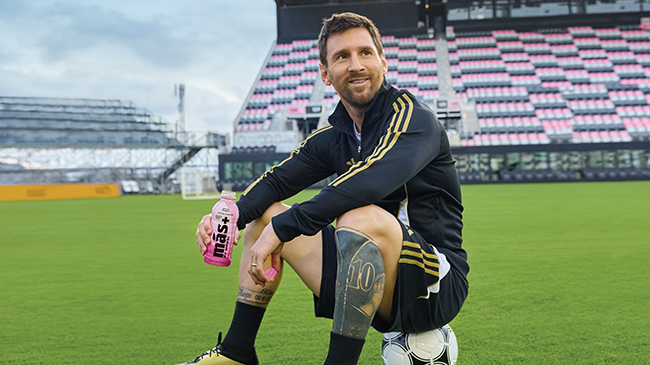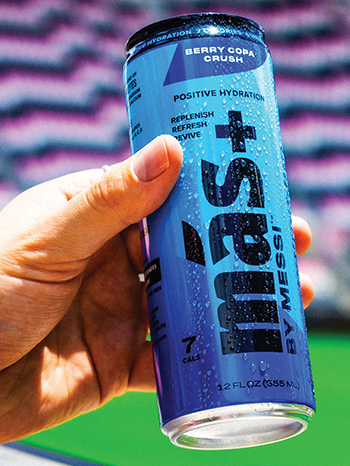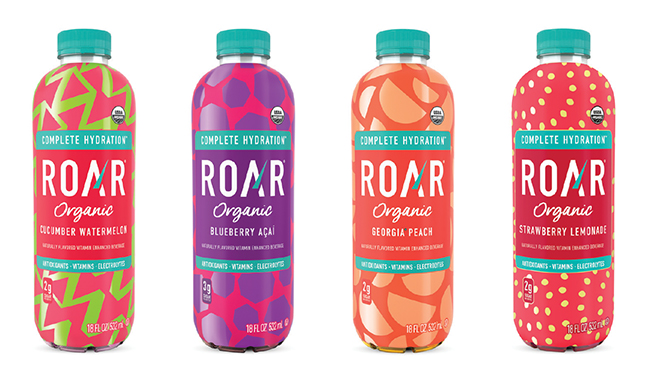Prime Movers: As Logan Paul’s Brand Stutters, Supplement Makers and Soccer’s Biggest Star Seek Their Own Sports Drink Fortunes
With the exception of Olympic years like this, the dog days of August are typically a dead-zone for American sports fans as they drift through scores of meaningless baseball games, killing time before the NFL season kicks off. Over in the sports drinks aisle, though, the season is just heating up.
The modern category remains dominated by the same power couple of Pepsi (Gatorade) and Coca-Cola (BODYARMOR, Powerade) but in the last several years, a few players have begun to break away from the chasing pack. Specifically, PRIME’s thunderous entrance in 2022 reshaped the landscape and showed how hydration is uniquely positioned to leverage the reach of high-visibility influencers for a mass audience. Despite weakening sales trends and ongoing distribution drama, the Congo Brands-led venture has still generated over $596 million in dollar sales year-over-year through early July, according to NielsenIQ data.
Meanwhile, Electrolit’s rise to a 4% category share has come on the back of a different approach; its square bottles, lack of celebs and straightforward function claims are more like Pedialyte than your typical sports drink. The low-key Mexican company doesn’t have PRIME’s always-on pitchmen Logan Paul and KSI, but its alliances (Keurig Dr Pepper for distribution) and recruitment (former Essentia strategy chief Neil Kimberley) are driving real market gains.
Each company’s individual success reflects the dynamism at play here: in many ways the old tricks are still working, but so are the new ones. Both will be needed to help sports drinks rebound from volume declines (-1.5%) in the wake of price hikes (+7.8%), according to Circana data through July 23. And as the likes of PRIME and Electrolit gain incremental share from the big guys, the next class behind them – a wide-open field of contenders like Mas+ by Messi, GHOST, Biolyte, Recover180, Roar Organic, Barcode and others – are likely to find space to fill.
Messi Makes His Mark
Nobody in football (soccer) history has put together a body of work quite like Lionel Messi. The Argentine soccer star’s career is adorned in glory at every level, from raising Olympic gold and multiple UEFA Champions League trophies to captaining his country to the FIFA World Cup at both youth and senior levels.
But winning the beverage game is a whole different challenge.
The player’s new venture – The Más+ Next Generation Beverage Co., created in partnership with Mark Anthony Brands, the maker of White Claw hard seltzers – is the vehicle for his grand business ambitions, but it’s starting with a soft entrance: Mas+ by Messi, a low-sugar (10 calories) isotonic sports drink in 16.9 oz. PET bottle and 12 oz. cans in four flavors – Miami Punch, Orange d’Or, Berry Copa Crush and Limón Lime League.
It’s not the first time a prominent athlete has teamed with a hydration beverage, but in the age of PRIME, the product represents another large-scale test of the potency of celebrity and personal brand to capture consumers within this increasingly loud category.
“[Lionel Messi’s] role in the creation of Más+ has been fully authentic,” said Rishi Daing, Executive Vice President of Más+ Next Generation Beverage Co. “He has never put his name on a brand like this, and we wanted to ensure we were all delivering on the quality and positivity that’s associated with the Messi name to create a drink like no other in existence, with flavors unlike anything else available on the market.”
Like PRIME, Mas+ is betting that the draw of its influential founder can steer consumers to take a chance on a new brand outside the familiar Gatorade-BODYARMOR axis. The soccer star has the third-most followed Instagram account of any U.S.-based individual (504 million), and authored the most-liked post in the social platform’s history (over 75 million) when he lifted the World Cup in December 2022. Since coming to MLS, Messi is the top-selling player across all sports on digital sports merchandise store Fanatics, according to CNBC.
What’s the difference? For one, Messi isn’t Logan Paul. The soft-spoken Argentine’s commercial image is more conservative and stage-managed than Paul’s off-the-cuff, digital-native persona – which may or may not be an advantage, depending on the audience. Whereas PRIME, Barcode and others have actively sought to expand their roster of ambassadors and sponsored teams – including, in PRIME’s case, Messi’s former club FC Barcelona and other top European teams – Mas+ by Messi doesn’t have plans as of now to extend beyond its namesake.
What Messi does have is an experienced partner. After deploying DSD houses including Reyes Beverage Group and Gold Coast Beverage in June to launch the brand at key South Florida retailers like Publix, Walmart, 7-Eleven and Target, Mas+ began rolling out to other markets in Florida and further states (plus Canada) in August “supported by a full range of merchandising,” said Daing. The “love for Messi is evident” from the region’s strong Latinx population – Bay Supermarket, a store in Miami’s Argentinian community, was chosen as the site for a first drop of collectible Mas+ bottles.
Though at 38 years old he continues to challenge for top honors at both individual and team levels, including this year’s Copa America tournament hosted in the U.S., Messi is older than Paul (29) and Barcode’s Victor Wembanyama (22) and coming towards the end of his playing career.
“Más+ is truly designed for everyone, and is meant to be enjoyed on occasions on and off the field, which we think will align perfectly with every part of Messi’s career and life,” said Daing.
Supplements Make The Jump
Messi isn’t the only one seeing white space in sports drinks. After forging a path for energy drinks from health and nutrition stores to mainstream retailers, a cohort of fitness and function-forward supplement makers are looking to do the same with RTD hydration.
GHOST represents another well-known brand trying its hand at this format, if not the category itself. The lifestyle supplement company has marketed a hydration powder for years but entered RTDs for the first time this January with the formal release of its four-SKU line in 16.9 oz. PET bottles, available in Orange Squeeze, Lemon Lime, Kiwi Strawberry and Sour Patch Kids “Redberry” flavors.
For GHOST and other supplement makers emerging from fitness and nutrition channels, making the jump to RTDs is proof that their brands can resonate outside of their core demographic. Lourenco noted that the product’s inspiration came in part from watching GHOST’s electrolyte powder tubs receive a strong reception in grocery and mass stores like Target; adding ready-to-drink is “an authentic extension of the rest of our product lineup,” he said.
Others are following that path, too. There’s also hydration powder brand LMNT, which made its ready-to-drink debut earlier this year with Sparkling Electrolyte Water in 16 oz. cans.
Elsewhere, retired U.S. Navy SEAL Jocko Willink in June expanded his nutrition platform with the launch of Jocko Hydrate RTDs, a bottled version of his brand’s powdered hydration mixes sold at GNC and The Vitamin Shoppe. Should trusted names like C4 or Alani Nu seek to formally make the jump to liquid hydration, it stands to reason that their respective fans would likely follow as well.
Drawing inspiration from health and fitness raises the stakes on ingredients; for seasoned consumers, electrolytes alone aren’t always enough. Adding caffeine has been one way to inject innovation — see Gatorade Fast Twitch and BODYARMOR Edge — but more function-specific additives represent the category’s next evolution. Barcode’s progressive take on hydration features, ashwagandha, Vitamin D and magnesium, while Local Weather touts its use of nootropics (l-theanine and L-tyrosine). Alongside the expected vitamins and electrolyte payload (996 mg), GHOST’s line features two trademarked ingredients – marine mineral complex Aquamin and exercise recovery booster Senactiv (NuLive Science).
“I say that we formulate for the 1%, and we build the brand, marketing, messaging and flavors for the 99%,” Lourenco said.
Relying on functionality remains a gamble in a category where consumers have historically overlooked ingredients in favor of fun and flavor. Scrutiny over PRIME’s efficacy as a hydrator haven’t hurt its sales, while elsewhere several CBD-powered RTDs like Defy and Offield have stalled in search of market traction. Still, not everyone needs “NFL-level” doses of electrolytes, argued Bill Lange, CEO or Roar Organic.
“Hydration is such a broad term – it is a definite need for consumers,” he said, citing the 75% of Americans who are chronically dehydrated. “This is hydration for the modern lifestyle.”
But at the risk of overdoing the sports metaphors, the team that does the best block and tackling typically wins in the end. To that end, supplement brands that have proven their chops in energy drinks have earned all-important credibility with distributors as they explore hydration – and as bigger names get taken off the board.
“I think the credibility and the relationship Anheuser-Busch has already built with Ghost over the last three to four years has played a big role,” said Lourenco. “I think the other thing that’s kind of happened here is, frankly, some of the distributors have lost some kind of competing sports drink brands over the past 12 or 18 months. And that’s created a little bit of a void and one that we are happy to fill.”


Receive your free magazine!
Join thousands of other food and beverage professionals who utilize BevNET Magazine to stay up-to-date on current trends and news within the food and beverage world.
Receive your free copy of the magazine 6x per year in digital or print and utilize insights on consumer behavior, brand growth, category volume, and trend forecasting.
Subscribe


